|
Functions |
| void | bt_init (BACKTRELLIS *bt) |
| | Initialize backtrellis that will hold the whole word trellis (called once on startup).
|
| void | bt_prepare (BACKTRELLIS *bt) |
| | Prepare backtrellis for the next input (called at beginning of each speech segment).
|
| void | bt_free (BACKTRELLIS *bt) |
| | Free memories of backtrellis.
|
| TRELLIS_ATOM * | bt_new (BACKTRELLIS *bt) |
| | Allocate a new trellis word atom.
|
| void | bt_store (BACKTRELLIS *bt, TRELLIS_ATOM *aotm) |
| | Store a trellis word generated on the 1st pass for the 2nd pass.
|
| void | bt_relocate_rw (BACKTRELLIS *bt) |
| | Re-locate the stored atom lists per frame (will be called after the 1st pass).
|
| void | set_terminal_words (RecogProcess *r) |
| | When using progressive decoding with short pause segmentation, This function extracts the best word hypothesis on head and tail of the current input segment just after the 1st pass ends, and store them as start/end word in the following 2nd pass.
|
| void | bt_discount_pescore (WCHMM_INFO *wchmm, BACKTRELLIS *bt, HTK_Param *param) |
| | Discount the output probabilities of the last state from the accumulated score on word edge for all trellis words survived on the 1st pass, for the acoustic re-computation on the 2nd pass.
|
| void | bt_discount_lm (BACKTRELLIS *bt) |
| | Subtract 2-gram scores at each trellis word for the 2nd pass.
|
| void | bt_sort_rw (BACKTRELLIS *bt) |
| | Sort the trellis words in the backtrellis by the word IDs per each frame, for rapid access on the 2nd pass.
|
| TRELLIS_ATOM * | bt_binsearch_atom (BACKTRELLIS *bt, int time, WORD_ID wkey) |
| | Search a word on the specified frame in a word trellis data.
|
|
void | make_iwcache_index (WCHMM_INFO *wchmm) |
| void | adjust_sc_index (WCHMM_INFO *wchmm) |
| | Adjust factoring data in tree lexicon for multipath transition handling.
|
| void | make_successor_list (WCHMM_INFO *wchmm) |
| | Main function to build whole successor list to lexicon tree.
|
| void | max_successor_cache_init (WCHMM_INFO *wchmm) |
| | Initialize factoring cache for a tree lexicon, allocating memory for cache.
|
| void | max_successor_cache_free (WCHMM_INFO *wchmm) |
| | Free all memory for factoring cache.
|
| LOGPROB | max_successor_prob (WCHMM_INFO *wchmm, WORD_ID lastword, int node) |
| | compute factoring LM score for the given word-internal node.
|
| LOGPROB * | max_successor_prob_iw (WCHMM_INFO *wchmm, WORD_ID lastword) |
| | Compute cross-word facgtoring values for word head nodes and return the list.
|
|
void | calc_all_unigram_factoring_values (WCHMM_INFO *wchmm) |
| boolean | can_succeed (WCHMM_INFO *wchmm, WORD_ID lastword, int node) |
| | Deterministic factoring for grammar-based recognition (Julian).
|
| boolean | get_back_trellis_init (HTK_Param *param, RecogProcess *r) |
| | Initialization of the frame synchronous beam search.
|
| boolean | get_back_trellis_proceed (int t, HTK_Param *param, RecogProcess *r, boolean final_for_multipath) |
| | Frame synchronous beam search: proceed for 2nd frame and later.
|
| void | get_back_trellis_end (HTK_Param *param, RecogProcess *r) |
| | Frame synchronous beam search: last frame.
|
| void | fsbeam_free (FSBeam *d) |
| | Free work area for the first pass.
|
| void | finalize_1st_pass (RecogProcess *r, int len) |
| | Finalize the 1st pass.
|
| int | decode_proceed (Recog *recog) |
| | Process one input frame for all recognition process instance.
|
| void | decode_end_segmented (Recog *recog) |
| | End procedure of the first pass (when segmented).
|
| void | decode_end (Recog *recog) |
| | End procedure of the first pass.
|
| boolean | get_back_trellis (Recog *recog) |
| | Frame synchronous beam search: the main (for batch mode).
|
| boolean | is_sil (WORD_ID w, RecogProcess *r) |
| | Check if the fiven word is a short-pause word.
|
| void | mfcc_copy_to_rest_and_shrink (MFCCCalc *mfcc, int start, int end) |
| | Split input parameter for segmentation.
|
| void | mfcc_shrink (MFCCCalc *mfcc, int p) |
| | Shrink the parameter sequence.
|
| boolean | detect_end_of_segment (RecogProcess *r, int time) |
| | Speech end point detection.
|
| void | finalize_segment (Recog *recog) |
| | Finalize the first pass for successive decoding.
|
|
void | spsegment_init (Recog *recog) |
|
boolean | spsegment_trigger_sync (Recog *recog) |
| boolean | spsegment_need_restart (Recog *recog, int *rf_ret, boolean *repro_ret) |
| | Check if rewind and restart of recognition is needed.
|
| void | spsegment_restart_mfccs (Recog *recog, int rewind_frame, boolean reprocess) |
| | Execute rewinding.
|
| LOGPROB | outprob_style (WCHMM_INFO *wchmm, int node, int last_wid, int t, HTK_Param *param) |
| | Calculate output probability on a tree lexion node.
|
| void | error_missing_right_triphone (HMM_Logical *base, char *rc_name) |
| | Triphone error message for right context.
|
| void | error_missing_left_triphone (HMM_Logical *base, char *lc_name) |
| | Triphone error message for left context.
|
| int | ngram_firstwords (NEXTWORD **nw, int peseqlen, int maxnw, RecogProcess *r) |
| | Get initial word hypotheses at the beginning.
|
| int | ngram_nextwords (NODE *hypo, NEXTWORD **nw, int maxnw, RecogProcess *r) |
| | Return the list of next word candidate.
|
| boolean | ngram_acceptable (NODE *hypo, RecogProcess *r) |
| | Acceptance check.
|
| int | dfa_firstwords (NEXTWORD **nw, int peseqlen, int maxnw, RecogProcess *r) |
| | Return initial word set from grammar.
|
| int | dfa_nextwords (NODE *hypo, NEXTWORD **nw, int maxnw, RecogProcess *r) |
| | Given a part-of-sentence hypothesis, returns the next word set defined by DFA grammar.
|
| boolean | dfa_acceptable (NODE *hypo, RecogProcess *r) |
| | Return whether the hypothesis is currently on final state.
|
| boolean | dfa_look_around (NEXTWORD *nword, NODE *hypo, RecogProcess *r) |
| | Check if the given nextword exists in the word trellis around the estimated connection time.
|
| void | segment_set_last_nword (NODE *hypo, RecogProcess *r) |
| | Set the previous word context for the recognition of the next input segment from the current recognition result.
|
| void | wchmm_fbs (HTK_Param *param, RecogProcess *r, int cate_bgn, int cate_num) |
| | Main function to perform stack decoding of the 2nd search pass.
|
| void | clear_stocker (StackDecode *s) |
| | Clear the node stocker for recycle.
|
| void | free_node (NODE *node) |
| | Stock an unused hypothesis node for recycle.
|
| NODE * | cpy_node (NODE *dst, NODE *src) |
| | Copy the content of node to another.
|
| NODE * | newnode (RecogProcess *r) |
| | Allocate a new hypothesis node.
|
| void | malloc_wordtrellis (RecogProcess *r) |
| | Allocate work area for trellis computation of a word.
|
|
void | free_wordtrellis () |
| | Free the work area for trellis computation of a word.
|
| void | scan_word (NODE *now, HTK_Param *param, RecogProcess *r) |
| | Compute the forward viterbi for the last word to update forward scores and ready for word connection.
|
| void | next_word (NODE *now, NODE *new, NEXTWORD *nword, HTK_Param *param, RecogProcess *r) |
| | Connect a new word to generate a next hypothesis.
|
| void | start_word (NODE *new, NEXTWORD *nword, HTK_Param *param, RecogProcess *r) |
| | Generate an initial hypothesis from given word.
|
| void | last_next_word (NODE *now, NODE *new, HTK_Param *param, RecogProcess *r) |
| | Hypothesis termination: set the final sentence scores of hypothesis that has already reached to the end.
|
| boolean | wav2mfcc (SP16 speech[], int speechlen, Recog *recog) |
| | Extract MFCC parameters with sentence CMN from given waveform.
|
| void | j_put_header (FILE *stream) |
| | Output application header.
|
| void | j_put_version (FILE *stream) |
| | Output version information.
|
| void | j_put_compile_defs (FILE *stream) |
| | Output compile-time settings.
|
| void | j_put_library_defs (FILE *stream) |
| | Output library configuration.
|
| WCHMM_INFO * | wchmm_new () |
| | Allocate a new tree lexicon structure.
|
| void | wchmm_free (WCHMM_INFO *w) |
| | Free all data in a tree lexicon.
|
| void | print_wchmm_info (WCHMM_INFO *wchmm) |
| | Output some specifications of the tree lexicon (size etc.
|
| boolean | build_wchmm (WCHMM_INFO *wchmm, JCONF_LM *lmconf) |
| | Build a tree lexicon from given word dictionary and language model.
|
| boolean | build_wchmm2 (WCHMM_INFO *wchmm, JCONF_LM *lmconf) |
| | Build a tree lexicon from given word dictionary and language model.
|
| void | wchmm_check_interactive (WCHMM_INFO *wchmm) |
| | Command loop to browse and check the structure of the constructed tree lexicon on startup.
|
| void | check_wchmm (WCHMM_INFO *wchmm) |
| | Check coherence of tree lexicon (for internal debug only!).
|
| boolean | RealTimeInit (Recog *recog) |
| | Initializations for the on-the-fly 1st pass decoding.
|
| boolean | RealTimePipeLinePrepare (Recog *recog) |
| | Preparation for the on-the-fly 1st pass decoding.
|
| boolean | RealTimeMFCC (MFCCCalc *mfcc, SP16 *window, int windowlen) |
| | Compute a parameter vector from a speech window.
|
| int | RealTimePipeLine (SP16 *Speech, int len, Recog *recog) |
| | Main function of the on-the-fly 1st pass decoding.
|
| int | RealTimeResume (Recog *recog) |
| | Resuming recognition for short pause segmentation.
|
| boolean | RealTimeParam (Recog *recog) |
| | Finalize the 1st pass on-the-fly decoding.
|
| void | RealTimeCMNUpdate (MFCCCalc *mfcc, Recog *recog) |
| | Update cepstral mean.
|
| void | RealTimeTerminate (Recog *recog) |
| | Terminate the 1st pass on-the-fly decoding.
|
| void | realbeam_free (Recog *recog) |
| | Free the whole work area for 1st pass on-the-fly decoding.
|
| void | word_align (WORD_ID *words, short wnum, HTK_Param *param, Sentence *s, RecogProcess *r) |
| | Do forced alignment per word for the given word sequence.
|
| void | phoneme_align (WORD_ID *words, short wnum, HTK_Param *param, Sentence *s, RecogProcess *r) |
| | Do forced alignment per phoneme for the given word sequence.
|
| void | state_align (WORD_ID *words, short wnum, HTK_Param *param, Sentence *s, RecogProcess *r) |
| | Do forced alignment per HMM state for the given word sequence.
|
| void | word_rev_align (WORD_ID *revwords, short wnum, HTK_Param *param, Sentence *s, RecogProcess *r) |
| | Do forced alignment per word for the given word sequence (reversed order).
|
| void | phoneme_rev_align (WORD_ID *revwords, short wnum, HTK_Param *param, Sentence *s, RecogProcess *r) |
| | Do forced alignment per phoneme for the given word sequence (reversed order).
|
| void | state_rev_align (WORD_ID *revwords, short wnum, HTK_Param *param, Sentence *s, RecogProcess *r) |
| | Do forced alignment per state for the given word sequence (reversed order).
|
|
void | opt_terminate () |
| void | j_output_argument_help (FILE *fp) |
| | Output help document.
|
| char * | filepath (char *filename, char *dirname) |
| | Change relative path to full path.
|
| boolean | opt_parse (int argc, char *argv[], char *cwd, Jconf *jconf) |
| | Option parsing.
|
| void | opt_release (Jconf *jconf) |
| | Free memories of variables allocated by option arguments.
|
| void | get_dirname (char *path) |
| | Get directory name from a path name of a file.
|
| boolean | config_file_parse (char *conffile, Jconf *jconf) |
| | Read and parse a jconf file, and set the specified option values.
|
| boolean | checkpath (char *filename) |
| | Check if a file actually exist and is readable.
|
| boolean | j_jconf_finalize (Jconf *jconf) |
| | Check and finalize jconf parameters.
|
| int | set_beam_width (WCHMM_INFO *wchmm, int specified) |
| | Determine beam width on the 1st pass.
|
| void | print_jconf_overview (Jconf *jconf) |
| | Output module overview in a global configuration variables to log.
|
| void | print_engine_info (Recog *recog) |
| | Output all informations of an engine instance to log.
|
|
void | system_bootup (Recog *recog) |
| boolean | adin_initialize (Recog *recog) |
| | Set up audio input device according to the jconf configurations.
|
| boolean | adin_initialize_user (Recog *recog, void *arg) |
| | Initialize audio input device using user-specified A/D-in functions.
|
| boolean | j_load_am (Recog *recog, JCONF_AM *amconf) |
| | Load an acoustic model.
|
| boolean | j_load_lm (Recog *recog, JCONF_LM *lmconf) |
| | Load a language model.
|
| boolean | j_load_all (Recog *recog, Jconf *jconf) |
| | Read in all models for recognition.
|
| boolean | j_launch_recognition_instance (Recog *recog, JCONF_SEARCH *sconf) |
| | Launch a recognition process instance.
|
| boolean | j_final_fusion (Recog *recog) |
| | Combine all loaded models and settings into one engine instance.
|
| void | create_mfcc_calc_instances (Recog *recog) |
| | Create MFCC calculation instance for AM processing instances and GMM.
|
| void | hmm_check (RecogProcess *r) |
| | Mode to do interactive triphone conversion check ("-check triphone").
|
|
void | visual_init (Recog *recog) |
|
void | visual_show (BACKTRELLIS *bt) |
|
void | visual2_init (int maxhypo) |
|
void | visual2_popped (NODE *n, int popctr) |
|
void | visual2_next_word (NODE *next, NODE *prev, int popctr) |
|
void | visual2_best (NODE *now, WORD_INFO *winfo) |
| boolean | gmm_init (Recog *recog) |
| | Initialization for computing GMM likelihoods.
|
| void | gmm_prepare (Recog *recog) |
| | Prepare for the next GMM computation.
|
| void | gmm_proceed (Recog *recog) |
| | Compute output probabilities of all GMM for a given input vector, and accumulate the results to the gmm_score buffer.
|
| void | gmm_end (Recog *recog) |
| | Finish the GMM computation for an input, and output the result.
|
| boolean | gmm_valid_input (Recog *recog) |
| | Return whether the last input was valid or invalid, from the result of GMM computation.
|
| void | gmm_free (Recog *recog) |
| | Free work area used for GMM calculation.
|
| void | wordgraph_init (WCHMM_INFO *wchmm) |
| | Define if you want debugging output for graph generation.
|
| void | wordgraph_free (WordGraph *wg) |
| | Free a graph word.
|
| void | put_wordgraph (FILE *fp, WordGraph *wg, WORD_INFO *winfo) |
| | Output information of a graph word in text in the format below: (n means the word).
|
| void | wordgraph_dump (FILE *fp, WordGraph *root, WORD_INFO *winfo) |
| | Output text information of all the words in word graph.
|
| WordGraph * | wordgraph_assign (WORD_ID wid, WORD_ID wid_left, WORD_ID wid_right, int leftframe, int rightframe, LOGPROB fscore_head, LOGPROB fscore_tail, LOGPROB gscore_head, LOGPROB gscore_tail, LOGPROB lscore, LOGPROB cmscore, RecogProcess *r) |
| | Return a newly allocated graph word candidates.
|
| boolean | wordgraph_check_and_add_rightword (WordGraph *wg, WordGraph *right, LOGPROB lscore) |
| | Check for the right context if the specified graph already exists, and add it if not yet.
|
| boolean | wordgraph_check_and_add_leftword (WordGraph *wg, WordGraph *left, LOGPROB lscore) |
| | Check for the left context if the specified graph already exists, and add it if not yet.
|
| void | wordgraph_save (WordGraph *wg, WordGraph *right, WordGraph **root) |
| | Register a graph word candidate to the word graph as a member.
|
|
WordGraph * | wordgraph_check_merge (WordGraph *now, WordGraph **root, WORD_ID next_wid, boolean *merged_p, JCONF_SEARCH *jconf) |
|
WordGraph * | wordgraph_dup (WordGraph *wg, WordGraph **root) |
| void | wordgraph_purge_leaf_nodes (WordGraph **rootp, RecogProcess *r) |
| | Post-processing step 1: Extract initial word graph.
|
| void | wordgraph_depth_cut (WordGraph **rootp, RecogProcess *r) |
| | Post-processing step 1.5: word graph depth cutting.
|
| void | wordgraph_adjust_boundary (WordGraph **rootp, RecogProcess *r) |
| | Post-processing step 2: Adjust word boundaries.
|
| void | wordgraph_clean (WordGraph **rootp) |
| | Free all the words in a word graph.
|
| void | wordgraph_compaction_thesame (WordGraph **rootp) |
| | Post-processing step 3: Bundle words (exactly the same ones).
|
| void | wordgraph_compaction_exacttime (WordGraph **rootp, RecogProcess *r) |
| | Post-processing step 4: Bundle words (same boundaries).
|
| void | wordgraph_compaction_neighbor (WordGraph **rootp, RecogProcess *r) |
| | Post-processing step 5: Bundle words (neighbor words).
|
| int | wordgraph_sort_and_annotate_id (WordGraph **rootp, RecogProcess *r) |
| | Sort words by left time and annotate sequencial id for them in a word graph.
|
| void | wordgraph_check_coherence (WordGraph *rootp, RecogProcess *r) |
| | For debug: Check the coherence in word graph.
|
| void | graph_forward_backward (WordGraph *root, RecogProcess *r) |
| | Compute graph-based confidence scores by forward-backward parsing on the generated lattice.
|
| void | jconf_set_default_values (Jconf *j) |
| | Fill in the system default values to a parameter structure Jconf.
|
| void | jconf_set_default_values_am (JCONF_AM *j) |
| | Fill in system default values to an AM parameter structure.
|
| void | jconf_set_default_values_lm (JCONF_LM *j) |
| | Fill in system default values to an LM parameter structure.
|
| void | jconf_set_default_values_search (JCONF_SEARCH *j) |
| | Fill in system default values to a search parameter structure.
|
| void | multigram_add (DFA_INFO *dfa, WORD_INFO *winfo, char *name, PROCESS_LM *lm) |
| | Add a new grammar to the current list of grammars.
|
| boolean | multigram_delete (int gid, PROCESS_LM *lm) |
| | Mark a grammar in the grammar list to be deleted at the next grammar update.
|
| void | multigram_delete_all (PROCESS_LM *lm) |
| | Mark all grammars to be deleted at next grammar update.
|
| boolean | multigram_update (PROCESS_LM *lm) |
| | Update global grammar if needed.
|
| boolean | multigram_build (RecogProcess *r) |
| | Check for global grammar and (re-)build tree lexicon if needed.
|
| int | multigram_activate (int gid, PROCESS_LM *lm) |
| | Activate a grammar in the grammar list.
|
| int | multigram_deactivate (int gid, PROCESS_LM *lm) |
| | Deactivate a grammar in the grammar list.
|
| boolean | multigram_load_all_gramlist (PROCESS_LM *lm) |
| | Load all the grammars specified at startup.
|
| int | multigram_get_gram_from_category (int category, PROCESS_LM *lm) |
| | Get which grammar the given category belongs to.
|
| int | multigram_get_all_num (PROCESS_LM *lm) |
| | Get the number of current grammars (both active and inactive).
|
| void | multigram_free_all (MULTIGRAM *root) |
| | Free all grammars.
|
| MULTIGRAM * | multigram_get_grammar_by_name (PROCESS_LM *lm, char *gramname) |
| | Find a grammar in LM by its name.
|
| MULTIGRAM * | multigram_get_grammar_by_id (PROCESS_LM *lm, unsigned short id) |
| | Find a grammar in LM by its ID number.
|
| boolean | multigram_add_words_to_grammar (PROCESS_LM *lm, MULTIGRAM *m, WORD_INFO *winfo) |
| | Append words to a grammar.
|
| boolean | multigram_add_words_to_grammar_by_name (PROCESS_LM *lm, char *gramname, WORD_INFO *winfo) |
| | Append words to a grammar, given by its name.
|
| boolean | multigram_add_words_to_grammar_by_id (PROCESS_LM *lm, unsigned short id, WORD_INFO *winfo) |
| | Append words to a grammar, given by its ID number.
|
| void | multigram_add_gramlist (char *dfafile, char *dictfile, JCONF_LM *j, int lmvar) |
| | Add a grammar to the grammar list to be read at startup.
|
| void | multigram_remove_gramlist (JCONF_LM *j) |
| | Remove the grammar list to be read at startup.
|
| boolean | multigram_add_prefix_list (char *prefix_list, char *cwd, JCONF_LM *j, int lmvar) |
| | Add multiple grammars given by their prefixs to the grammar list.
|
| boolean | multigram_add_prefix_filelist (char *listfile, JCONF_LM *j, int lmvar) |
| | Add multiple grammars from prefix list file to the grammar list.
|
| void | adin_setup_param (ADIn *adin, Jconf *jconf) |
| | Set up parameters for A/D-in and input detection.
|
| boolean | adin_thread_create (Recog *recog) |
| | Start new A/D-in thread, and initialize buffer.
|
| int | adin_go (int(*ad_process)(SP16 *, int, Recog *), int(*ad_check)(Recog *), Recog *recog) |
| | Top function to start input processing.
|
| boolean | adin_standby (ADIn *a, int freq, void *arg) |
| | Call device-specific initialization.
|
| boolean | adin_begin (ADIn *a) |
| | Call device-specific function to begin capturing of the audio stream.
|
| boolean | adin_end (ADIn *a) |
| | Call device-specific function to end capturing of the audio stream.
|
| void | adin_free_param (Recog *recog) |
| | Free memories of A/D-in work area.
|
| CN_CLUSTER * | confnet_create (WordGraph *root, RecogProcess *r) |
| | Create a confusion network from word graph.
|
| void | graph_make_order (WordGraph *root, RecogProcess *r) |
| | Extract order relationship between any two words in the word graph for confusion network generation.
|
|
void | graph_free_order () |
| | Free the order relation data.
|
| void | cn_free_all (CN_CLUSTER **croot) |
| | Free all cluster holders.
|
| void | callback_init (Recog *recog) |
| | Initialize callback management area.
|
| int | callback_add (Recog *recog, int code, void(*func)(Recog *recog, void *data), void *data) |
| | Register a function to a callback registory.
|
| int | callback_add_adin (Recog *recog, int code, void(*func)(Recog *recog, SP16 *buf, int len, void *data), void *data) |
| | Register a function to the A/D-in type callback registory.
|
| void | callback_exec (int code, Recog *recog) |
| | Execute all functions assigned to a callback registory.
|
| void | callback_exec_adin (int code, Recog *recog, SP16 *buf, int len) |
| | Execute all functions assigned to a A/D-in callback.
|
| boolean | callback_exist (Recog *recog, int code) |
| | Check if at least one function has been registered to a callback repository.
|
| boolean | callback_delete (Recog *recog, int id) |
| | Delete an already registered function from callback.
|
| void | result_sentence_malloc (RecogProcess *r, int num) |
| | Allocate storage of recognition results.
|
| void | result_sentence_free (RecogProcess *r) |
| | Free storage of recognition results.
|
| void | clear_result (RecogProcess *r) |
| | Clear all result storages for next input.
|










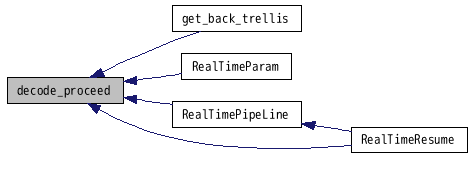

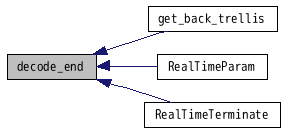









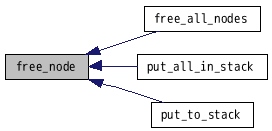

























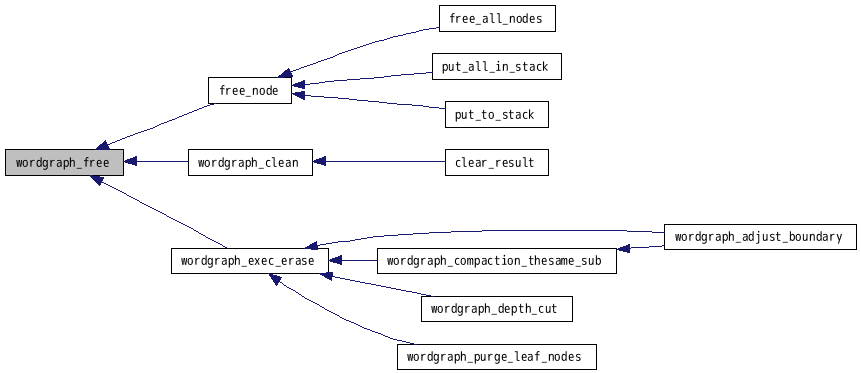
















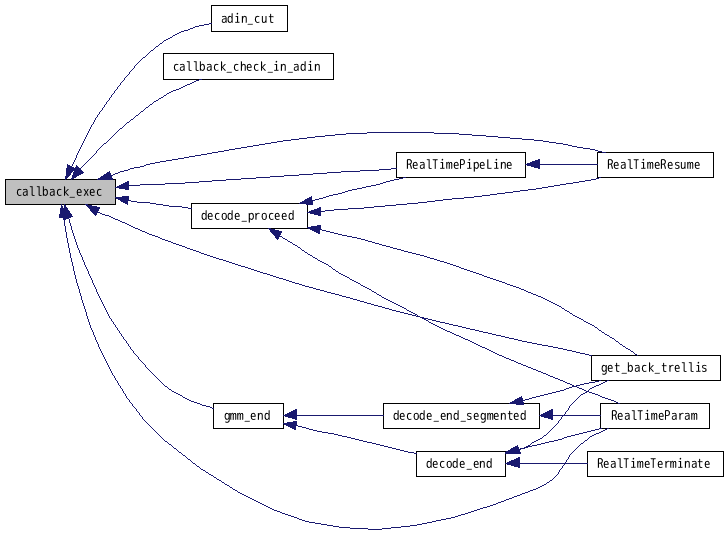


 1.5.4
1.5.4